必修五Unit4 Making the news 单元课件(共81张PPT)
文档属性
| 名称 | 必修五Unit4 Making the news 单元课件(共81张PPT) |
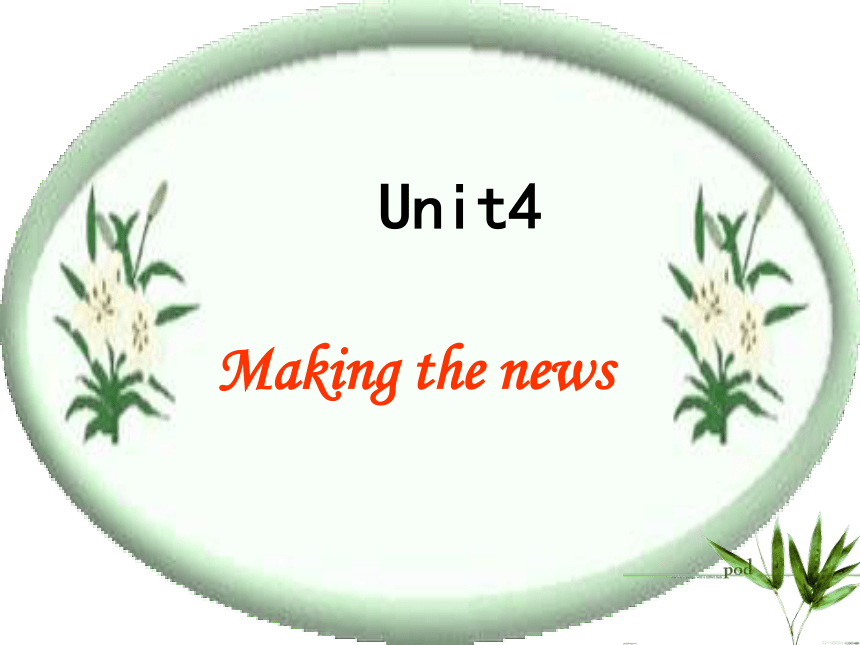
|
|
| 格式 | ppt | ||
| 文件大小 | 2.3MB | ||
| 资源类型 | 教案 | ||
| 版本资源 | 人教版(新课程标准) | ||
| 科目 | 英语 | ||
| 更新时间 | 2021-01-06 00:00:00 | ||
图片预览

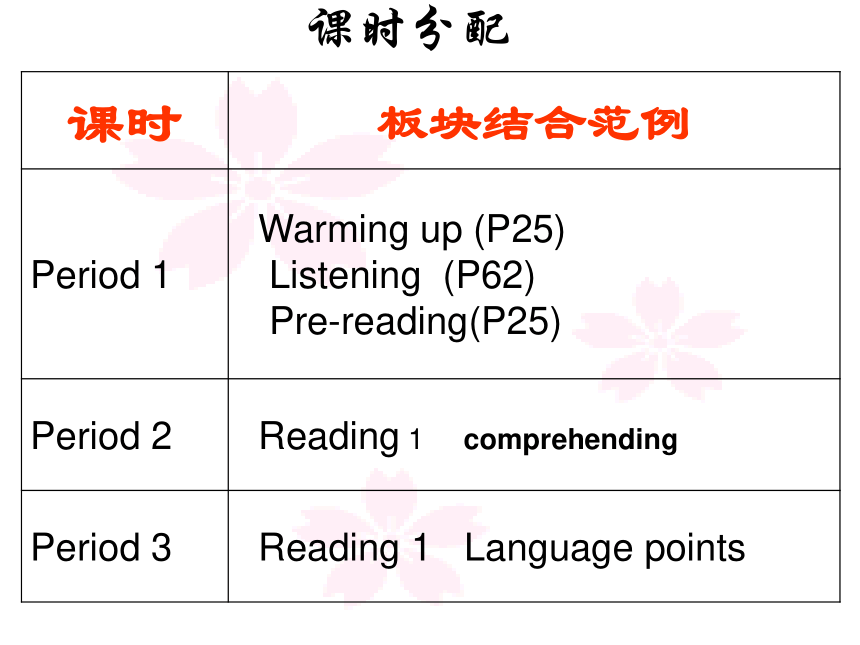
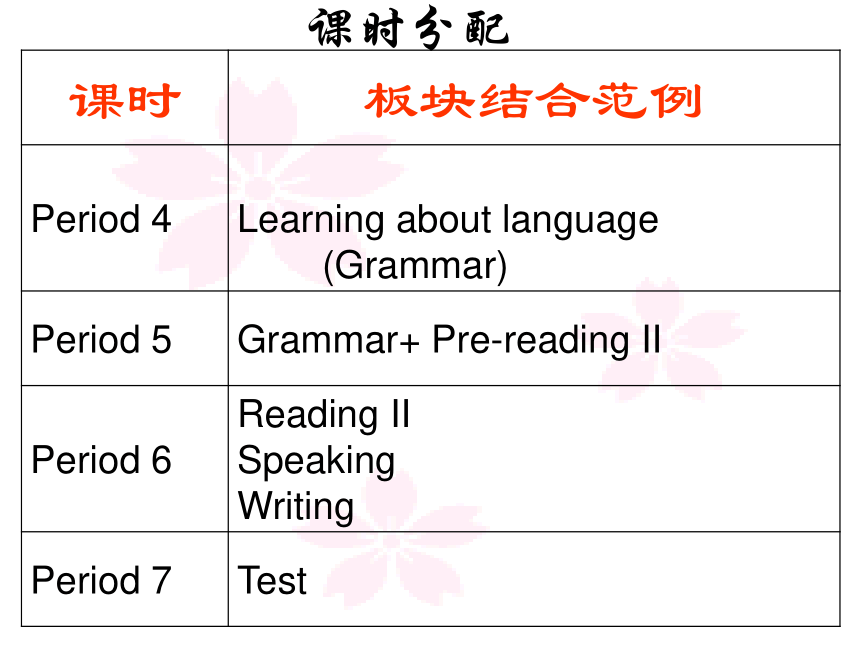

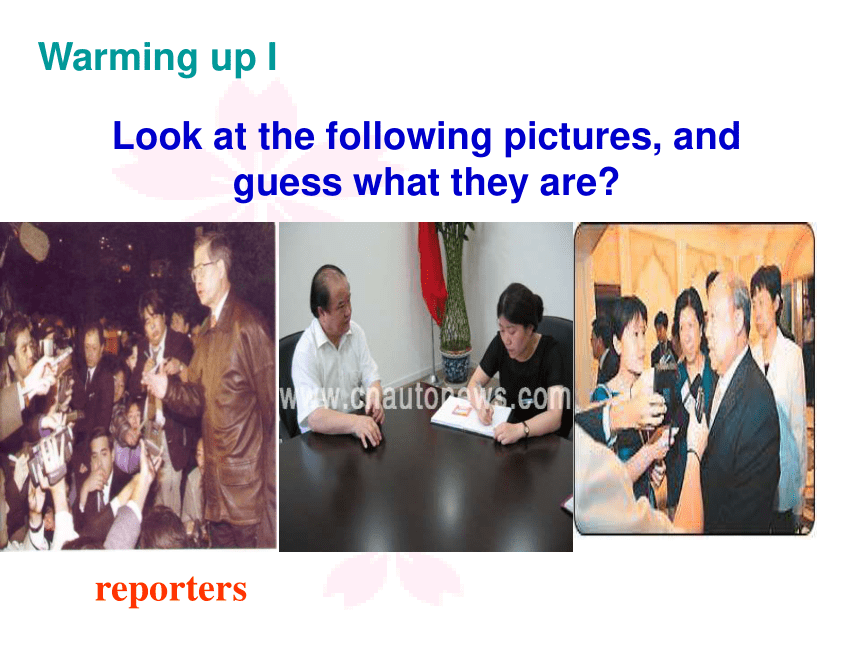
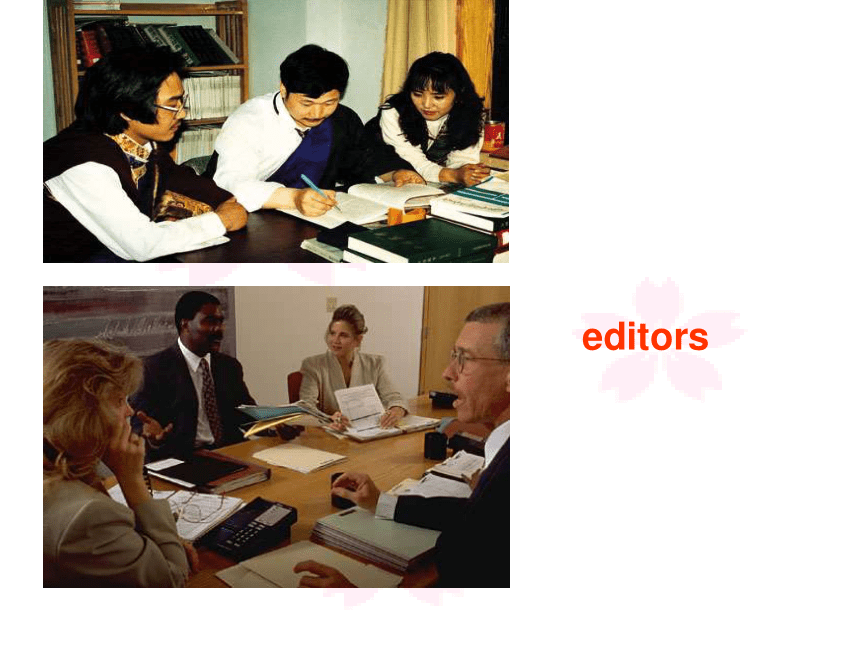
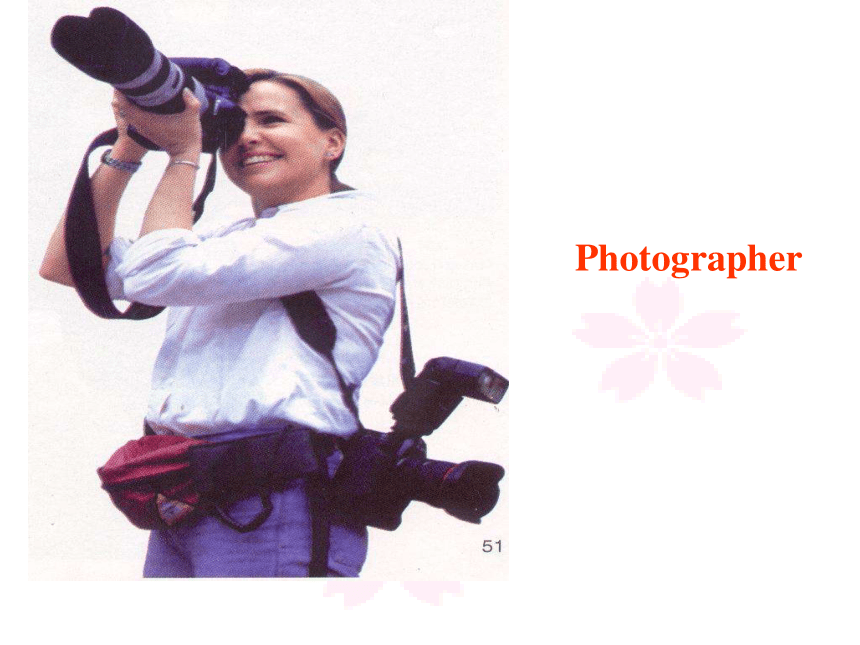
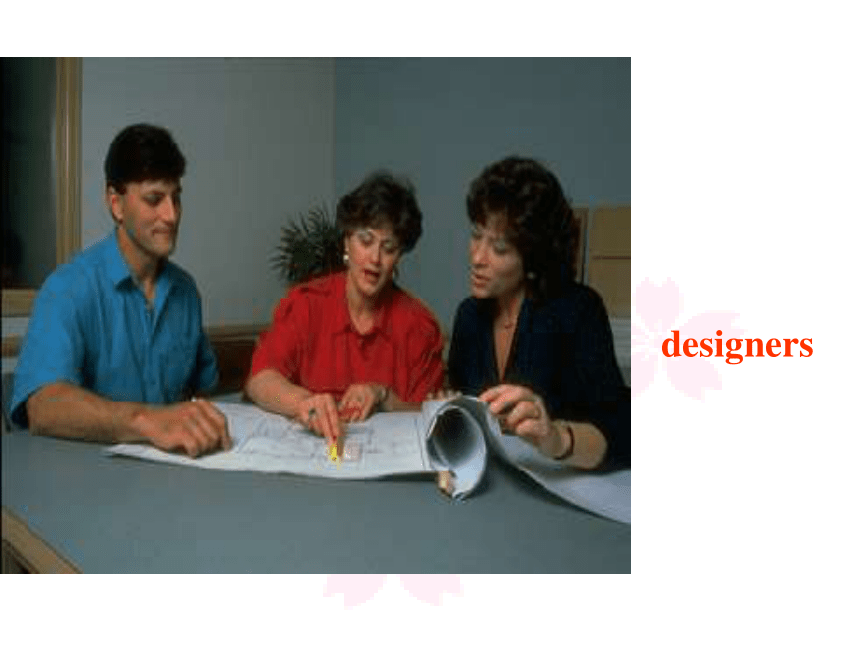
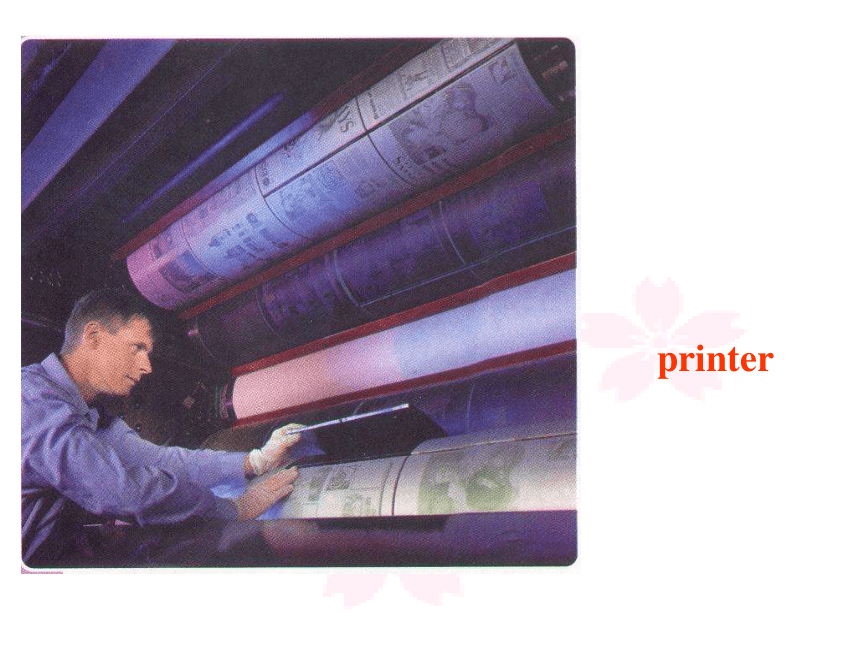
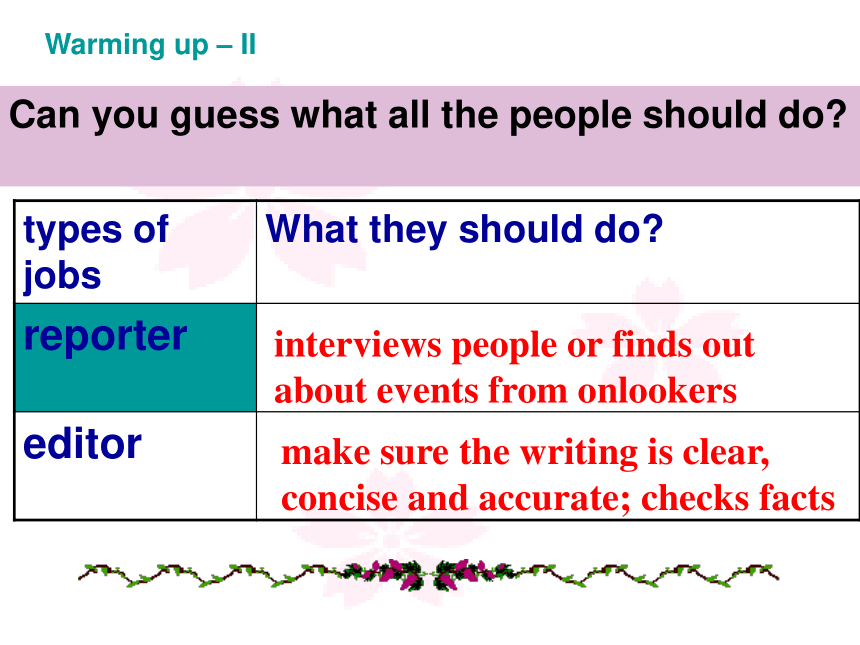
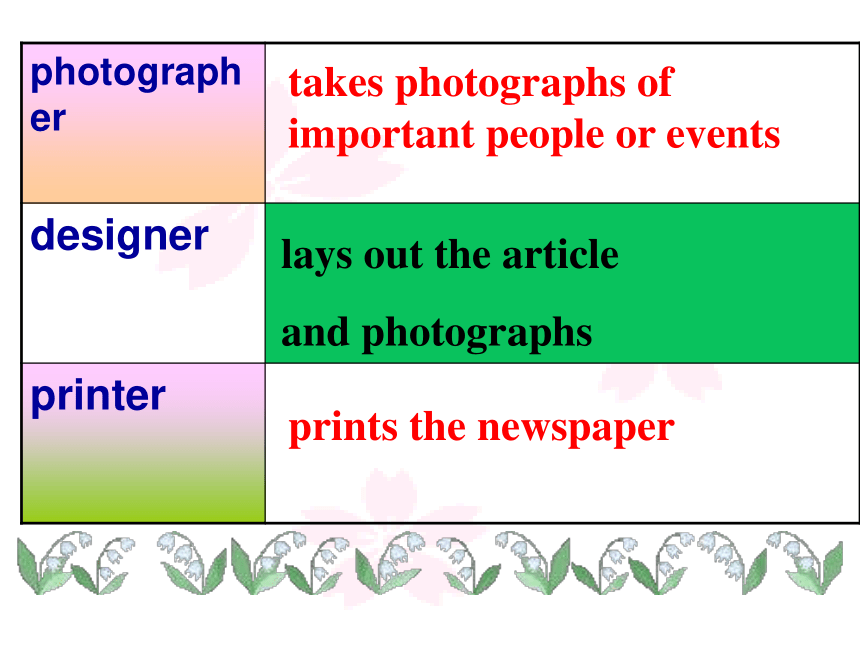
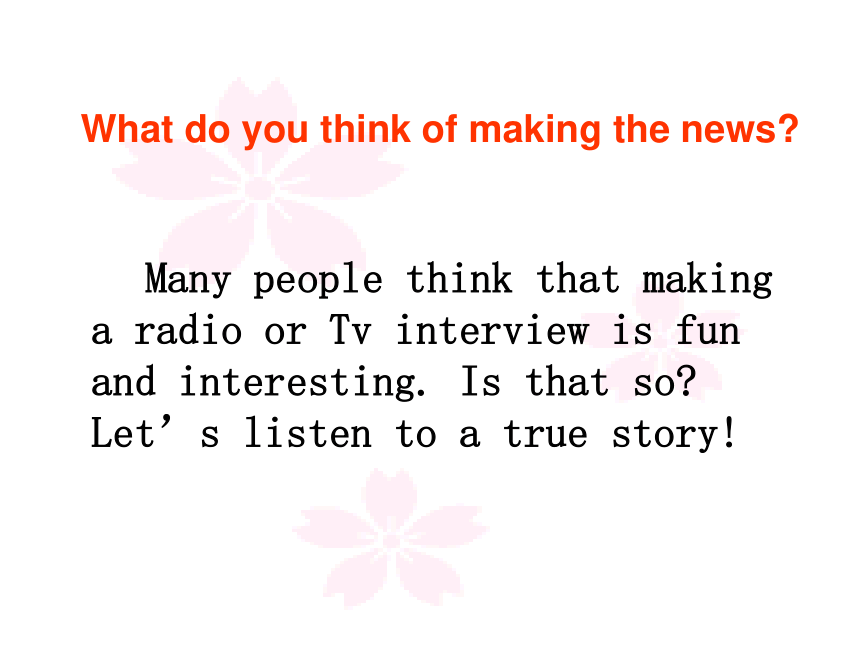
文档简介
Unit4
Making the news
课时分配
课时
板块结合范例
Period 1
Warming up (P25)
Listening (P62)
Pre-reading(P25)
Period 2
Reading 1 comprehending
Period 3
Reading 1 Language points
课时分配
课时
板块结合范例
Period 4
Learning about language
(Grammar)
Period 5
Grammar+ Pre-reading II
Period 6
Reading II
Speaking
Writing
Period 7
Test
Warming up
reporters
Look at the following pictures, and guess what they are?
Warming up I
editors
Photographer
designers
printer
Can you guess what all the people should do?
types of jobs
What they should do?
reporter
editor
interviews people or finds out about events from onlookers
make sure the writing is clear, concise and accurate; checks facts
Warming up – II
photographer
designer
printer
takes photographs of important people or events
lays out the article
and photographs
prints the newspaper
Many people think that making a radio or Tv interview is fun and interesting. Is that so? Let’s listen to a true story!
What do you think of making the news?
Listening
Listening
Listening Task on Page 62.
1) Listen to tape for the first time and finish Ex. 1 on Page 62, then check the answers.
Day
Time
Place
Thursday
6 am
BBC TV station
2) Listen to tape for two more times and finish Ex. 2 on Page 62, then check the answers.
He had to go to the BBC radio station because the sound effects are better there.
He was anxious because he wondered if he had got the right day or the right time.
The windows are described as dark. They are like large, tired day.
Greg knew the house was empty because the bell echoed through empty rooms.
He felt very relieved when the man appeared next to him.
Pr-reading I
Do you want to work for a newspaper?
If yes, what do you want to do?Why?
Pre-reading – I
Pre-reading – II
If you want to be a reporter, do you think what qualities a good news reporter needs to have?
Students give their own answers according to Ex 1 on Page 25.
Reading I
Reading – I Skimming
Read the text in 1 minute, and find out all the questions Zhou Yang asked.
Students underline all the questions.
Reading – II Pair work
Discuss in pairs:
Are these questions good questions?
What are they about?
All these questions are finding out more about the qualities and skills needed for the job to be a reporter.
Reading – III Group work
Read the text carefully, and finish the following chart about how to become a reporter.(work in groups)
Questions about
Zhou Yang’s answers
The skills needed
1. be able to _______________
_________________________ .
2. be _______ 3. do ________
4. ask ___________
The importance of listening
get the _________________
tell if someone
is telling the truth
accurate
research
questions
detailed facts
Questions about
Zhou Yang’s answers
Stages in researching a story
1. ____________________
2. note _______
3. ________ facts
4. do ___________
How to check facts
use _________ and ask ________
How to deal with accusations of printing lies
use _________________ for the
____________
ask questions
reactions
check
research
research
witnesses
a tape recorder
interview
Reading – IV main idea
Read the passage again and divide it into three sections, each of which looks at one duty of a reporter. Then write down the main idea of the whole passage.
Duties:1. to work in a team
2. how to get an accurate story
3. how to protect a story from accusations
Main idea:the passage tells us about the qualities needed to be a good reporter, how to get an accurate story and how to protect a story from accusation.
Practice – interviewing
Divide the students into two groups to do an interview, one interviewer is Zhang Ziyi, another one is Yao Ming.
After the interview, ask the students to answer the questions: What is your biggest problem to become a reporter? How can you change it?
Assignment
Surf the Internet to find more information about how to become a reporter and you are expected to present it to your classmates in the next class.
Language points
for reading I
Words and expressions:
occupation n a job or employment 职业
taking possession 占有
occupation, job, work, profession 和 trade辨析
四个词都有“工作”之意。
occupation 较为正式,经常用在填写表格上。
job是可数名词,可指一个单独任务,也可指工作职位
work是不可数名词,泛指一切工作。
profession一般指需要专门技能,尤指需要较高教育水 平的某一行业、职业,如医生或律师。
Practice:
选词填空
( occupation, job, profession, work )
a. Please state your name,age and_________ below.
b. I have a few _____ to do in the house this morning.
c. Looking after children all day is hard____
d. My husband is at the very to of medical____________ .
occupation
jobs
work
profession
2) concentrate vt. to give all one’s attention to sth and not to think about anything else.集中
to come or bring together at one place 聚集
※ concentrate on (doing) sth 专注于(做)某事
concentrate the /one’s mind 集中注意力; 聚精会神
concentrate one’s effort/attention on sth 集中力量/注意力于某事
concentration n. 专心;聚集
※
※
※
Practice:
完成句子:
Stop talking and ________________________ .
( 专心工作 )
b. Nothing ____________________ ( 集中注意力 ) better than the knowledge that you could die tomorrow.
c. I decided to ________________________ ( 全力以赴 ) finding somewhere to live.
concentrate on your work
concentrates the mind
concentrate all my efforts on
3) meanwhile, during, while 词义辨析
meanwhile意为“同时”,与at the same time意思相同。意为“期间”时,是副词,在句中单独做状语。
during 意为“在、、、期间”,是介词,后接名词、代词。
while 意为“在、、、期间”,是连词,引导时间状语从句。
4) accuse, charge, blame 词义辨析
accuse (指控 )sb. of ( doing ) sth.
charge ( 指控 )sb. with ( doing ) sth.
accuse ( 指责 )sb. of (doing ) sth.
blame ( 责备 )sb. for ( doing ) sth.
{
{
2. Difficulties
Can I go out on a story immediately?
我可以马上出去采访吗?
on 后接一些名词如visit, holiday, business, trip等,常与come, go等动词连用,用来说明活动或状态。
Practice:
她决定今年暑假去一趟英国。
She decided to go ______________ to England this summer.
他去了长途旅行。
He has been away __________________ .
on a visit
on a long trip
2) Only when you have seen what he or she does, can you cover a story by yourself.只有等你见习了他们的工作之后,你才能独自去进行新闻采访。
cover 和 interview 的辨析:
cover 意为“采访”、“报道”,宾语往往为事。interview 意为“采访”,宾语往往为人。
选词填空:( cover, interview )
I want to ________ him about his research work.
The best reporters were sent to _______ the war.
interview
cover
3) NO need for a camera! 不需要带相机!
no need…是句型There is no need …的省略形式,need 后面可以接for/of ( doing ) sth 或( for sb ) to do作后置定语。
介词填空:
There is no need ______ that sort of thing.
There is no need ______ hurrying; we still have time.
There is no need ______ you to worry about the matter.
for
of
for
Learning about language
Checking answer – I (2m)
Answer keys for Ex.1 on Page 28:
Expressions
idiomatic meaning
to report on an important event
clever ways known to experts
to present ideas fairly
not to understand an idea properly
this is the story
to get the story first
cover a story
trick of the trade
get the facts straight
get the wrong end of the stick
this is how the story goes
get a scoop
Checking answer – II (2m)
Answer keys for Ex.2 on Page 28-29:
deliberately
2. guilty
3. concentrate…on
4. professional
5. eager
6. thorough
7. accuse … of
8. acquire
Checking answer – III ( 4m )
Answer keys for Ex.3 on Page 29:
Noun
Adjective
Meaning
profession
professional
to act like a person trained for a particular job
educational
form
education
connected with the teaching of students
formal
an official part of an activity
Noun
Adjective
Meaning
tradition
person
occupational
traditional
following ideas and methods used for a long time
personal
something to do with oneself
occupation
related to one’s job
Useful structure ( 30m )
一、概述:
英语句子的基本语序是主语在前,谓语动词在后(the natural order) ,当语序颠倒时就成了倒装结构( the inverted order) 。把谓语的全部放在主语之前称为完全倒装;而只把助动词或情态动词放在主语之前,则称为部分倒装。
二、全部倒装句有:
1. here, there, now, then, thus,out,away, up,down等副词置于句首, 谓语动词常用be,come, go, lie, run。当其主语为名词时,通常要使用倒装。例如:
a. There goes the bell.
b. Then came the chairman.
c. Here is your letter.
d. Away went the boy to the school!
e. Off goes the woman!
注意:上述全部倒装的句型结构的主语必须是名词,如果主语是人称代词则不能倒装。
Here he comes. Away they went.
2. 以引导词there开头的句子,须使用倒装结构,除 there be 外还有there Live / stand / lie / exist等。例如:
a. There are three books on the desk.
b.There lived an old fisherman near the sea.
c.There stands a tall building in the centre of the town.
3. so, neither, nor表示前面所述一件事也适合另一个人或物时.So用于肯定句,neither/nor用于否定句. a.Tom can speak French. So can Jack.
b.If you don't go, neither will I.
注意:1) 当 so引出的句子用以对上文内容加以证实或肯定时,不可用倒装结构。意为"的确如此"。
Tom asked me to go to play football and so I did.
---It's raining hard. ---So it is.
2)但如果上文所述两件事也适合另一个人或物,就用 So it is /was with sb.或It is/was the same with sb.
Marx was born in Germany and German was his native language. So it was with Engls.
4. 介词短语做地点状语放在句首
Eg. a.In the cottage lives a family of six.
b.Near the bridge was an old cottage.
c.In front of the house sat a little boy.
三、部分倒装句有:
1. 疑问句
a.Have you seen the film?
b.When are we going to drink to your happiness?
注意:如疑问词在句中做主语,则用自然语序。
c. Who is your sister?
d.What is our work?
2. so/such...that的so/such位于句首时,
Eg.a.So loudly did the students read that people could hear them out in the street.
b.So small were the words that he could hardly see them.
c.Such a famous man he is that everyone wants to take a photo with him.
3. 否定意义的副词或短语位于句首时,常见的有:
in no way, not only…but also, never, little, rarely, seldom, hardly... When, no sooner…than, scarcely…when, in no case, not until(当Not until引出主从复合句,主句倒装,从句不倒装。)等.
Eg. a. Not until the child fell asleep did the mother leave the room.
b.Hardly?can?I?follow?you.
??? c.Seldom?do?I?visit?USA.
d. Never have I seen such a performance .
注意: 如否定词不在句首不倒装。
e. I have never seen such a performance.
f. The mother didn't leave the room until the child fell asleep.
.
4. 由as或though 引导的让步壮语从句。
表语十as+主语十系动词be.
动词原形+as+主语十助动词.例如:
eg. a. Young as he is, he knows some of the family
. b. Try as I might, I could not lift the stone.
注意:当单数名词位于句首时,名词前无冠词。
eg. c. Child as he is,he knows good English.
5. 省略连词“if”的条件副词分句,如:
a.Were I you, I would not do such a thing.
= If I were you, I would not do such a thing.
b.Would the machine break down again, send it back to us.
= If the machine would break down again, send it back to us.
c.Had you worked harder, you would have passed.
= If you had worked harder, you would have passed.
6. 有些表示“感叹、祝愿”等语气的句子,也可使用倒装结构
Eg.a. Isn‘t it cold!
天气真冷!
b.May both be happy!
祝你们两位幸福!
c. May God bless you.
愿上帝赐福于你。
d. Long live the king!
国王万岁!
7. Only 位于句首,强调句子的状语时。
Eg.a. Only then did I fully understand what my father said.
只有到那时,我才充分理解我父亲讲的话.
b. Only when I left school did I realize how important study is.
只有当我离开学校时,我才意识到学习有多么重要。
注意:如果only强调的是句子主语时。不倒装。
Eg. c. Only he can help us.
1. ______ to rain tomorrow , they would put off the meeting.
A. If it should B. If were it C. Should it D. were it
2. ______ got into the room ______ the telephone rang.
A. No sooner had he, when B. He hardly had, then
C. Hardly had he, when D. He hardly had, then
3. ______ find out what had happened.
A. Until he woke up did he B. Until he woke up to
C. Not until did he wake up he D. Not until he woke up did he .
4. Little ______ about his own health though he was very ill.
A. he cared B. he cares C. does he care D. did he care
D
C
D
D
Practice – choosing ( 10m )
5. Early in the day ______ the news ______ the enemy were gone.
A. come, that B. came , that C. comes ,that D. came , what
6. Not only ______ strict with us, but also ______ for us.
A. was the teacher ; did he care B. was the teacher ; he cared
C. the teacher was ; did he care D. the teacher was ; did he care
7. ______, he knows a lot of English .
A. Child as he is B. As he is a Child
C. A child as he is D. Child though he was
8. ______ the cat , she has to give it to the neighbor.
A. As she likes much B. As she much likes
C. Much as she likes D. As much she likes
B
B
C
A
9. Be quick! ______.
A. Here comes the bus B. The bus here comes
C. The bus come here D. Here the bus comes
10. If you want to go there, ______.
A. so will I B. so I will C. I will so D. so do I
11. In front of the farmhouse ______.
A. does a small boy sit B. did a small boy sit
C. sit a small boy D. sat a small boy
12. Scarcely ______ down when ______ a knock at the door.
A. had he sat ; did he hear B. he had sat ; did he hear
C. he had sat ; he heard D. had he sat ; he heard
A
A
D
D
13. Here ______.
A. does he come B. he comes C, comes he D. he come
14. Only ______ that.
A. can a doctor do B. a doctor can do
C. can do a doctor D. can a doctor does
15. Not even once ______ a lie.
A. has Mike told B. Mike has told C. had Mike told D. Mike had told
16. Up ______ into the air.
A. went the arrow B. the arrow went C. did the arrow go D. does the arrow go
B
B
A
A
17. Not for a moment ______ what he said.
A. I believed B. did I believe C. I would believe D. I believe
18. In ______ and the students stood up.
A. the teacher comes B. the teacher coming
C. came the teacher D. did the teacher come
19. No sooner ______ begun to speak than I realized that something
was wrong.
A. he has B. he had C. had he D. did he
B
C
C
1. ---- I would never come to this restaurant
again. The food is terrible!
---- _______ . ( 2004全国 )
A. Nor am I B. Neither would I
C. Same with me D. So do I
答案B。第一个句子使用了would, 用neither表示附和的意义时,助动词应与上文一致。
高考链接
2. I failed in the final examination last term and only then _____ the importance of studies.
( 2004重庆 )
A. I realized B. I had realized
C. had I realized D. did I realize
解析:答案为D. 句首为“only + 副词”时,句子要用部分倒装语序;根据语境应为一般过去时态。
3. ---- Will you go skating with me this winter vacation?
---- It ___ . ( 2002上海)
all depended B. all depends
C. is all depended D. is all depending
解析:答案B。It all depends 是“不确定”、“看情况”的意思。
Assignment
1. Summarize the rules of inversion in your own way.
2. Finish the exercises of “Discovering useful structures” on Page 29.
3. Pre-reading II
Get ready for the following tasks
1.Read the passage and answer the following questions:
a)Do you want to get some information everyday?
b)How can you get the information?
c) Can you guess how complex it is to make news?
3.Read the text and try to get the main idea of it.
4.Read the passage and finish the chart for the writing and printing process for an article.
Finish the following tasks after class
Reading II
Listening
Speaking
writing
Answer the following questions:
Do you want to get some information everyday? How can you get the information?
2. Can you guess how complex it is to make news?
There are so many ways to get information, but reading newspapers is one of the oldest.
This class we’ll learn a passage about how to make news. Let’s come to the passage.
Task I
Discuss the main idea of the text.
Main idea: the passage tells us the process of writing and printing for a newspaper article.
Task 2
Filling the chart
→
2. You do some research to see if the story is true or not.
1.
↓
←
4.
3.
You go to an interview to get the information for your story
You begin to write the story using the notes from the interview.
You give the article to the sub-editor to check.
Task 3
→
6.
5.
↓
←
8.
7. All the stories and photos are set and the colour negatives for the printing are made ready.
The article is given to a native speaker to check the use of English and improve the style.
The first edition of the newspaper is printed.
The last stage the article is checked /approved by the chief editor.
Reading -- III thinking ( 8m )
Read the passage again and think about the following questions:
What did you think about making news and being a reporter before you read this passage? How about now? Do you think it’s a easy job to be a reporter?
Students give their own answers.
Ask the students to answer the following question:
If you were a reporter of China Daily and you had a task to interview a famous person, who would you like to interview? Why?
Warming up for listening
Listening – I Ex. 1 on Page 31.
Listen to the passage for the first time, then circle the correct summary of it.
Key: summary B
Listening – II
Ex. 2 on Page 32.
1) Listen to the tape for the second time and try to find the answers for Ex.2 on Page 32.
2) Listen to the tape for the third time and check the answers.
Answer keys for the Ex.2 on page 32.
He wants to interview him about his decision to go aboard and work.
His fans are worried that they will not see him in the flesh.
Liu Ming will talk to Zhou Yang on Wednesday at 12 o’clock.
Liu Ming’s intention is to learn more about tennis and return to China.
Warming up
1. From the passage on Page 30—31 we know the steps to make news, now would you like to have a try?
2. If you have a chance to be the reporter of our school newspaper, will you take it? Why?
Writing – I making an interview
Suppose you are the reporter of our school newspaper, and you want to write a newspaper article about an excellent student.
Now make an interview in pairs, one is the reporter, another one is the excellent student, then change the roles.
( When you interview your partner you should write down the information you get. )
Writing – II (
After the interview, the students write an article about the excellent student.
( There are at least 100 words. )
Writing – III
Checking the articles.
1. Ask the students to check the articles for their partners.
2. Show some articles on the screen, other students should give some advice.
策划:《学生双语报》
*
????????????????????????????????????????????????
Thank you!
Making the news
课时分配
课时
板块结合范例
Period 1
Warming up (P25)
Listening (P62)
Pre-reading(P25)
Period 2
Reading 1 comprehending
Period 3
Reading 1 Language points
课时分配
课时
板块结合范例
Period 4
Learning about language
(Grammar)
Period 5
Grammar+ Pre-reading II
Period 6
Reading II
Speaking
Writing
Period 7
Test
Warming up
reporters
Look at the following pictures, and guess what they are?
Warming up I
editors
Photographer
designers
printer
Can you guess what all the people should do?
types of jobs
What they should do?
reporter
editor
interviews people or finds out about events from onlookers
make sure the writing is clear, concise and accurate; checks facts
Warming up – II
photographer
designer
printer
takes photographs of important people or events
lays out the article
and photographs
prints the newspaper
Many people think that making a radio or Tv interview is fun and interesting. Is that so? Let’s listen to a true story!
What do you think of making the news?
Listening
Listening
Listening Task on Page 62.
1) Listen to tape for the first time and finish Ex. 1 on Page 62, then check the answers.
Day
Time
Place
Thursday
6 am
BBC TV station
2) Listen to tape for two more times and finish Ex. 2 on Page 62, then check the answers.
He had to go to the BBC radio station because the sound effects are better there.
He was anxious because he wondered if he had got the right day or the right time.
The windows are described as dark. They are like large, tired day.
Greg knew the house was empty because the bell echoed through empty rooms.
He felt very relieved when the man appeared next to him.
Pr-reading I
Do you want to work for a newspaper?
If yes, what do you want to do?Why?
Pre-reading – I
Pre-reading – II
If you want to be a reporter, do you think what qualities a good news reporter needs to have?
Students give their own answers according to Ex 1 on Page 25.
Reading I
Reading – I Skimming
Read the text in 1 minute, and find out all the questions Zhou Yang asked.
Students underline all the questions.
Reading – II Pair work
Discuss in pairs:
Are these questions good questions?
What are they about?
All these questions are finding out more about the qualities and skills needed for the job to be a reporter.
Reading – III Group work
Read the text carefully, and finish the following chart about how to become a reporter.(work in groups)
Questions about
Zhou Yang’s answers
The skills needed
1. be able to _______________
_________________________ .
2. be _______ 3. do ________
4. ask ___________
The importance of listening
get the _________________
tell if someone
is telling the truth
accurate
research
questions
detailed facts
Questions about
Zhou Yang’s answers
Stages in researching a story
1. ____________________
2. note _______
3. ________ facts
4. do ___________
How to check facts
use _________ and ask ________
How to deal with accusations of printing lies
use _________________ for the
____________
ask questions
reactions
check
research
research
witnesses
a tape recorder
interview
Reading – IV main idea
Read the passage again and divide it into three sections, each of which looks at one duty of a reporter. Then write down the main idea of the whole passage.
Duties:1. to work in a team
2. how to get an accurate story
3. how to protect a story from accusations
Main idea:the passage tells us about the qualities needed to be a good reporter, how to get an accurate story and how to protect a story from accusation.
Practice – interviewing
Divide the students into two groups to do an interview, one interviewer is Zhang Ziyi, another one is Yao Ming.
After the interview, ask the students to answer the questions: What is your biggest problem to become a reporter? How can you change it?
Assignment
Surf the Internet to find more information about how to become a reporter and you are expected to present it to your classmates in the next class.
Language points
for reading I
Words and expressions:
occupation n a job or employment 职业
taking possession 占有
occupation, job, work, profession 和 trade辨析
四个词都有“工作”之意。
occupation 较为正式,经常用在填写表格上。
job是可数名词,可指一个单独任务,也可指工作职位
work是不可数名词,泛指一切工作。
profession一般指需要专门技能,尤指需要较高教育水 平的某一行业、职业,如医生或律师。
Practice:
选词填空
( occupation, job, profession, work )
a. Please state your name,age and_________ below.
b. I have a few _____ to do in the house this morning.
c. Looking after children all day is hard____
d. My husband is at the very to of medical____________ .
occupation
jobs
work
profession
2) concentrate vt. to give all one’s attention to sth and not to think about anything else.集中
to come or bring together at one place 聚集
※ concentrate on (doing) sth 专注于(做)某事
concentrate the /one’s mind 集中注意力; 聚精会神
concentrate one’s effort/attention on sth 集中力量/注意力于某事
concentration n. 专心;聚集
※
※
※
Practice:
完成句子:
Stop talking and ________________________ .
( 专心工作 )
b. Nothing ____________________ ( 集中注意力 ) better than the knowledge that you could die tomorrow.
c. I decided to ________________________ ( 全力以赴 ) finding somewhere to live.
concentrate on your work
concentrates the mind
concentrate all my efforts on
3) meanwhile, during, while 词义辨析
meanwhile意为“同时”,与at the same time意思相同。意为“期间”时,是副词,在句中单独做状语。
during 意为“在、、、期间”,是介词,后接名词、代词。
while 意为“在、、、期间”,是连词,引导时间状语从句。
4) accuse, charge, blame 词义辨析
accuse (指控 )sb. of ( doing ) sth.
charge ( 指控 )sb. with ( doing ) sth.
accuse ( 指责 )sb. of (doing ) sth.
blame ( 责备 )sb. for ( doing ) sth.
{
{
2. Difficulties
Can I go out on a story immediately?
我可以马上出去采访吗?
on 后接一些名词如visit, holiday, business, trip等,常与come, go等动词连用,用来说明活动或状态。
Practice:
她决定今年暑假去一趟英国。
She decided to go ______________ to England this summer.
他去了长途旅行。
He has been away __________________ .
on a visit
on a long trip
2) Only when you have seen what he or she does, can you cover a story by yourself.只有等你见习了他们的工作之后,你才能独自去进行新闻采访。
cover 和 interview 的辨析:
cover 意为“采访”、“报道”,宾语往往为事。interview 意为“采访”,宾语往往为人。
选词填空:( cover, interview )
I want to ________ him about his research work.
The best reporters were sent to _______ the war.
interview
cover
3) NO need for a camera! 不需要带相机!
no need…是句型There is no need …的省略形式,need 后面可以接for/of ( doing ) sth 或( for sb ) to do作后置定语。
介词填空:
There is no need ______ that sort of thing.
There is no need ______ hurrying; we still have time.
There is no need ______ you to worry about the matter.
for
of
for
Learning about language
Checking answer – I (2m)
Answer keys for Ex.1 on Page 28:
Expressions
idiomatic meaning
to report on an important event
clever ways known to experts
to present ideas fairly
not to understand an idea properly
this is the story
to get the story first
cover a story
trick of the trade
get the facts straight
get the wrong end of the stick
this is how the story goes
get a scoop
Checking answer – II (2m)
Answer keys for Ex.2 on Page 28-29:
deliberately
2. guilty
3. concentrate…on
4. professional
5. eager
6. thorough
7. accuse … of
8. acquire
Checking answer – III ( 4m )
Answer keys for Ex.3 on Page 29:
Noun
Adjective
Meaning
profession
professional
to act like a person trained for a particular job
educational
form
education
connected with the teaching of students
formal
an official part of an activity
Noun
Adjective
Meaning
tradition
person
occupational
traditional
following ideas and methods used for a long time
personal
something to do with oneself
occupation
related to one’s job
Useful structure ( 30m )
一、概述:
英语句子的基本语序是主语在前,谓语动词在后(the natural order) ,当语序颠倒时就成了倒装结构( the inverted order) 。把谓语的全部放在主语之前称为完全倒装;而只把助动词或情态动词放在主语之前,则称为部分倒装。
二、全部倒装句有:
1. here, there, now, then, thus,out,away, up,down等副词置于句首, 谓语动词常用be,come, go, lie, run。当其主语为名词时,通常要使用倒装。例如:
a. There goes the bell.
b. Then came the chairman.
c. Here is your letter.
d. Away went the boy to the school!
e. Off goes the woman!
注意:上述全部倒装的句型结构的主语必须是名词,如果主语是人称代词则不能倒装。
Here he comes. Away they went.
2. 以引导词there开头的句子,须使用倒装结构,除 there be 外还有there Live / stand / lie / exist等。例如:
a. There are three books on the desk.
b.There lived an old fisherman near the sea.
c.There stands a tall building in the centre of the town.
3. so, neither, nor表示前面所述一件事也适合另一个人或物时.So用于肯定句,neither/nor用于否定句. a.Tom can speak French. So can Jack.
b.If you don't go, neither will I.
注意:1) 当 so引出的句子用以对上文内容加以证实或肯定时,不可用倒装结构。意为"的确如此"。
Tom asked me to go to play football and so I did.
---It's raining hard. ---So it is.
2)但如果上文所述两件事也适合另一个人或物,就用 So it is /was with sb.或It is/was the same with sb.
Marx was born in Germany and German was his native language. So it was with Engls.
4. 介词短语做地点状语放在句首
Eg. a.In the cottage lives a family of six.
b.Near the bridge was an old cottage.
c.In front of the house sat a little boy.
三、部分倒装句有:
1. 疑问句
a.Have you seen the film?
b.When are we going to drink to your happiness?
注意:如疑问词在句中做主语,则用自然语序。
c. Who is your sister?
d.What is our work?
2. so/such...that的so/such位于句首时,
Eg.a.So loudly did the students read that people could hear them out in the street.
b.So small were the words that he could hardly see them.
c.Such a famous man he is that everyone wants to take a photo with him.
3. 否定意义的副词或短语位于句首时,常见的有:
in no way, not only…but also, never, little, rarely, seldom, hardly... When, no sooner…than, scarcely…when, in no case, not until(当Not until引出主从复合句,主句倒装,从句不倒装。)等.
Eg. a. Not until the child fell asleep did the mother leave the room.
b.Hardly?can?I?follow?you.
??? c.Seldom?do?I?visit?USA.
d. Never have I seen such a performance .
注意: 如否定词不在句首不倒装。
e. I have never seen such a performance.
f. The mother didn't leave the room until the child fell asleep.
.
4. 由as或though 引导的让步壮语从句。
表语十as+主语十系动词be.
动词原形+as+主语十助动词.例如:
eg. a. Young as he is, he knows some of the family
. b. Try as I might, I could not lift the stone.
注意:当单数名词位于句首时,名词前无冠词。
eg. c. Child as he is,he knows good English.
5. 省略连词“if”的条件副词分句,如:
a.Were I you, I would not do such a thing.
= If I were you, I would not do such a thing.
b.Would the machine break down again, send it back to us.
= If the machine would break down again, send it back to us.
c.Had you worked harder, you would have passed.
= If you had worked harder, you would have passed.
6. 有些表示“感叹、祝愿”等语气的句子,也可使用倒装结构
Eg.a. Isn‘t it cold!
天气真冷!
b.May both be happy!
祝你们两位幸福!
c. May God bless you.
愿上帝赐福于你。
d. Long live the king!
国王万岁!
7. Only 位于句首,强调句子的状语时。
Eg.a. Only then did I fully understand what my father said.
只有到那时,我才充分理解我父亲讲的话.
b. Only when I left school did I realize how important study is.
只有当我离开学校时,我才意识到学习有多么重要。
注意:如果only强调的是句子主语时。不倒装。
Eg. c. Only he can help us.
1. ______ to rain tomorrow , they would put off the meeting.
A. If it should B. If were it C. Should it D. were it
2. ______ got into the room ______ the telephone rang.
A. No sooner had he, when B. He hardly had, then
C. Hardly had he, when D. He hardly had, then
3. ______ find out what had happened.
A. Until he woke up did he B. Until he woke up to
C. Not until did he wake up he D. Not until he woke up did he .
4. Little ______ about his own health though he was very ill.
A. he cared B. he cares C. does he care D. did he care
D
C
D
D
Practice – choosing ( 10m )
5. Early in the day ______ the news ______ the enemy were gone.
A. come, that B. came , that C. comes ,that D. came , what
6. Not only ______ strict with us, but also ______ for us.
A. was the teacher ; did he care B. was the teacher ; he cared
C. the teacher was ; did he care D. the teacher was ; did he care
7. ______, he knows a lot of English .
A. Child as he is B. As he is a Child
C. A child as he is D. Child though he was
8. ______ the cat , she has to give it to the neighbor.
A. As she likes much B. As she much likes
C. Much as she likes D. As much she likes
B
B
C
A
9. Be quick! ______.
A. Here comes the bus B. The bus here comes
C. The bus come here D. Here the bus comes
10. If you want to go there, ______.
A. so will I B. so I will C. I will so D. so do I
11. In front of the farmhouse ______.
A. does a small boy sit B. did a small boy sit
C. sit a small boy D. sat a small boy
12. Scarcely ______ down when ______ a knock at the door.
A. had he sat ; did he hear B. he had sat ; did he hear
C. he had sat ; he heard D. had he sat ; he heard
A
A
D
D
13. Here ______.
A. does he come B. he comes C, comes he D. he come
14. Only ______ that.
A. can a doctor do B. a doctor can do
C. can do a doctor D. can a doctor does
15. Not even once ______ a lie.
A. has Mike told B. Mike has told C. had Mike told D. Mike had told
16. Up ______ into the air.
A. went the arrow B. the arrow went C. did the arrow go D. does the arrow go
B
B
A
A
17. Not for a moment ______ what he said.
A. I believed B. did I believe C. I would believe D. I believe
18. In ______ and the students stood up.
A. the teacher comes B. the teacher coming
C. came the teacher D. did the teacher come
19. No sooner ______ begun to speak than I realized that something
was wrong.
A. he has B. he had C. had he D. did he
B
C
C
1. ---- I would never come to this restaurant
again. The food is terrible!
---- _______ . ( 2004全国 )
A. Nor am I B. Neither would I
C. Same with me D. So do I
答案B。第一个句子使用了would, 用neither表示附和的意义时,助动词应与上文一致。
高考链接
2. I failed in the final examination last term and only then _____ the importance of studies.
( 2004重庆 )
A. I realized B. I had realized
C. had I realized D. did I realize
解析:答案为D. 句首为“only + 副词”时,句子要用部分倒装语序;根据语境应为一般过去时态。
3. ---- Will you go skating with me this winter vacation?
---- It ___ . ( 2002上海)
all depended B. all depends
C. is all depended D. is all depending
解析:答案B。It all depends 是“不确定”、“看情况”的意思。
Assignment
1. Summarize the rules of inversion in your own way.
2. Finish the exercises of “Discovering useful structures” on Page 29.
3. Pre-reading II
Get ready for the following tasks
1.Read the passage and answer the following questions:
a)Do you want to get some information everyday?
b)How can you get the information?
c) Can you guess how complex it is to make news?
3.Read the text and try to get the main idea of it.
4.Read the passage and finish the chart for the writing and printing process for an article.
Finish the following tasks after class
Reading II
Listening
Speaking
writing
Answer the following questions:
Do you want to get some information everyday? How can you get the information?
2. Can you guess how complex it is to make news?
There are so many ways to get information, but reading newspapers is one of the oldest.
This class we’ll learn a passage about how to make news. Let’s come to the passage.
Task I
Discuss the main idea of the text.
Main idea: the passage tells us the process of writing and printing for a newspaper article.
Task 2
Filling the chart
→
2. You do some research to see if the story is true or not.
1.
↓
←
4.
3.
You go to an interview to get the information for your story
You begin to write the story using the notes from the interview.
You give the article to the sub-editor to check.
Task 3
→
6.
5.
↓
←
8.
7. All the stories and photos are set and the colour negatives for the printing are made ready.
The article is given to a native speaker to check the use of English and improve the style.
The first edition of the newspaper is printed.
The last stage the article is checked /approved by the chief editor.
Reading -- III thinking ( 8m )
Read the passage again and think about the following questions:
What did you think about making news and being a reporter before you read this passage? How about now? Do you think it’s a easy job to be a reporter?
Students give their own answers.
Ask the students to answer the following question:
If you were a reporter of China Daily and you had a task to interview a famous person, who would you like to interview? Why?
Warming up for listening
Listening – I Ex. 1 on Page 31.
Listen to the passage for the first time, then circle the correct summary of it.
Key: summary B
Listening – II
Ex. 2 on Page 32.
1) Listen to the tape for the second time and try to find the answers for Ex.2 on Page 32.
2) Listen to the tape for the third time and check the answers.
Answer keys for the Ex.2 on page 32.
He wants to interview him about his decision to go aboard and work.
His fans are worried that they will not see him in the flesh.
Liu Ming will talk to Zhou Yang on Wednesday at 12 o’clock.
Liu Ming’s intention is to learn more about tennis and return to China.
Warming up
1. From the passage on Page 30—31 we know the steps to make news, now would you like to have a try?
2. If you have a chance to be the reporter of our school newspaper, will you take it? Why?
Writing – I making an interview
Suppose you are the reporter of our school newspaper, and you want to write a newspaper article about an excellent student.
Now make an interview in pairs, one is the reporter, another one is the excellent student, then change the roles.
( When you interview your partner you should write down the information you get. )
Writing – II (
After the interview, the students write an article about the excellent student.
( There are at least 100 words. )
Writing – III
Checking the articles.
1. Ask the students to check the articles for their partners.
2. Show some articles on the screen, other students should give some advice.
策划:《学生双语报》
*
????????????????????????????????????????????????
Thank you!
